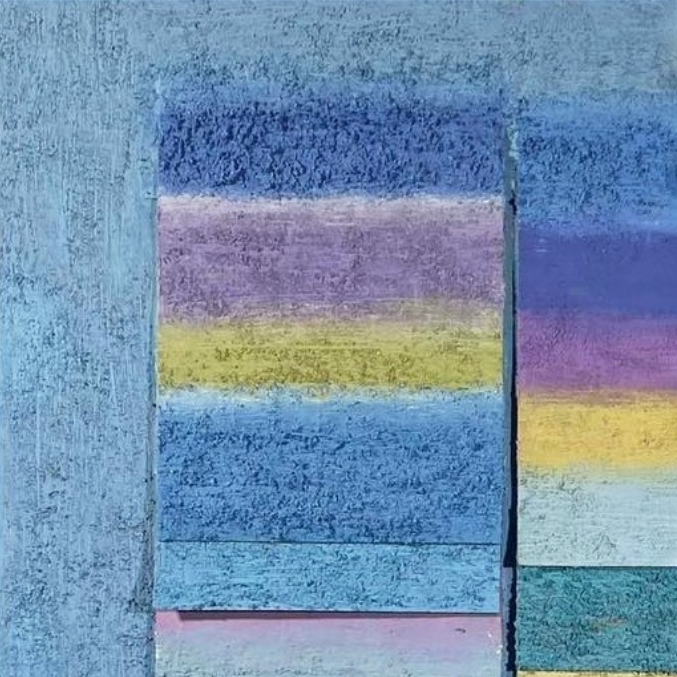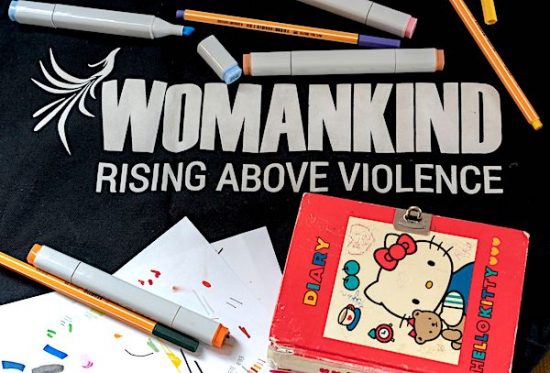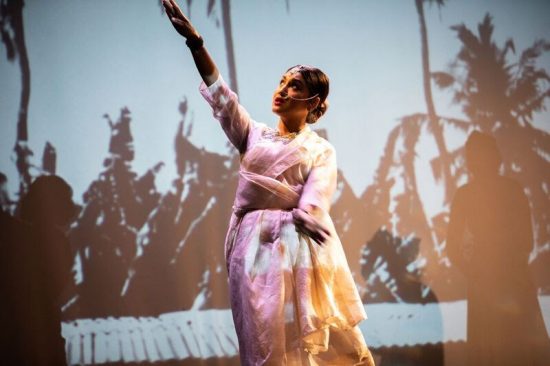How learning a third language became a place of reconciliation for my mother tongues.

October 25, 2023
This essay is part of Transpacific Literary Project’s monthly column, with art by Mit Jai Inn.
“History is ever arriving. So it’s most likely that the decision, seemingly all mine,
–Don Mee Choi, DMZ Colony
was already made years ago by someone else, which is to say, language—
that is to say, translation—always arises from collective consciousness.”
Before getting diagnosed with Alzheimer’s, my maternal halmuni was consulted in all matters revolving around big life decisions: job transitions, marriage, geographic moves, and other milestones. On our birthdays, she gave alms at the temple and released turtles into the Han River to bless our next year in life. In summers when my mom took my brother and I to see our grandparents, I glimpsed Halmuni’s daily morning routine through my jetlagged stupor: long before anyone stirred awake, she would take pocketfuls of silkworm chrysalises to the garden and feed the magpies, black-blue feathered friends believed to bring good tidings. By the time we were eating breakfast, Halmuni would already be sitting on the floor with a sheaf of newspapers, stamping the names of the entire extended family over and over in black ink—the repetition of our names like an utterance into the spirit world to bend the fate of her family toward luck.
Everyone depends on Halmuni to bestow a name to new life born into the family. Her name divination process braids together earth and lunar time: the year, month, day, and hour of birth; the presence of wood, fire, earth, metal, or water coinciding with cosmic cycles; and the number of strokes in the characters of the name, as well as their rhythm and sound. The actual meaning of the characters becomes secondary to the earthly elements, musicality, and celestial bodies converging to conceive a name that continually blesses its keeper.
I carry her alternate mode of meaning-making with me wherever I go, granting me passage to different languages, histories, and ways of seeing the world.
㊊
My relationship to Korean has always been strained at best. Korean is the language in which my mother knows a song for every flower, exclaims in response to physical pain, and wails lament. She devoted astonishing labor to ensure her American-born kids would not just grasp Korean but use the language with uncompromising precision. Despite my mother’s best efforts, English began outpacing Korean as my home language, and an unspoken estrangement between my mom and me began outpacing our ability to bridge such distance. Her loyalty was to Korea, and even when we were growing up stateside, her standard for us was elsewhere.
Unlike my mom, my dad spent only three years growing up in Korea. As the middle child of one of the first families to serve diplomatic missions from Korea in the sixties, he crisscrossed Kuwait, Japan, Bolivia, and the United States. My parents’ collective sense of elsewhere—neither here nor there—is one such landless, borderless place I inherited.
My brother, dad, and I often heard the same refrain from my mother: “I’m the only real Korean in this family,” which made me laugh as much as it stung. Somewhere in her aggrieved tone was the fact that my language was not up to snuff, that I was not Korean enough. My mom’s knee jerk to my every spelling mistake, unfit word used out of context, and ignorance to tacit cultural codes registered in me as disinheriting events. We swallowed any sting of inadequacy we may have felt to make room for her, the homesickness she felt for a place, language, and a wholly different manner of being far from the Connecticut suburb where we created our home.
When I started college, my dad lost his job due to the economic downturn and remained unemployed for several years. Following a crushing streak of false starts, he found a job in Korea and I returned to Connecticut in the winter of 2013 to help pack. My throwaway pile far exceeded my keep pile, and among the casualties were bow-tied teddy bears and corduroy rabbits my dad had brought home from work trips when I was little. In opposition to my parents’ hoarding tendency, I was adamant about keeping just one or two teddy bears as mementos—but my mom got visibly upset as she rifled through the packed box and clutched the stuffed animals to her chest. With harsh words, I questioned how she could possibly move with so much unnecessary baggage. As a fresh twenty-something, I did not get that it was not about me. That my mom was grieving the goodbye to our childhood and the home we carved out together through our languages and the distance between them.That her life and her family had been changed at its very core by the American life she’d so spurned.
What I didn’t know in all those years my mom painstakingly paddled upstream to give me her mother tongue was that my mom felt disinherited by me, too. The teddy bears and rabbits my mother re-inherited from me, now sitting on her dresser in Seoul, bear witness to her success and failure to keep alive in me a language that was oceans away.
㊊
When we talk about inheritance, we often think of artifacts passed down to us—for me, I think of the soft, silver leather pumps my mom wore on her wedding day. Or the scrolls of jagged peaks and blossoming boughs my Halmuni captured in her bold brush stroke paintings that I carry with me through every move. But alongside tangible relics are inheritances that are harder to place, far more elusive in shape and manner.
To be pitted between languages is to engage in a daily act of translation, and the translator must exist in a perpetual state of vigilance.. Even as a child, I was acutely aware of how my family had to translate ourselves for different settings. As I was coming of age in predominantly white schools and workplaces, the prerequisite for translating myself into English often felt like pledging allegiance to whiteness—while in familial contexts, translating myself into unbungled Korean often felt like a prerequisite to belonging. I didn’t always know it, but those moments in which I did not feel free to remain my untranslated self—small acts of negation—eroded away at my lineage, languages, and possibilities of the self. This, too, is a kind of inheritance.
In her essay “A Phenomenology of Whiteness,” Sara Ahmed writes on inheritance:
“It is not so much that we inherit habits, although we can do so: rather the
habitual can be thought of as a bodily and spatial form of inheritance.…If habits are about what bodies do, in ways that are repeated, then they might also shape what bodies can do.”
For all the intangible things I’ve inherited and continue to make sense of, Ahmed’s spatial definition of inheritance offers a framework for tracing back to previous generations and asking: What modes of existing and surviving were within reach for my lineage? What modes of thriving were out of reach, and why?
As Ahmed puts it, it is by “showing how we are stuck, by attending to what is habitual and routine in ‘the what’ of the world, that we can keep open the possibility of habit changes.” For those of us accustomed to taking up as little space as possible, unless we call into question the spatial habits of places designed to unsee us, we remain stuck in definitions written into centuries of policy and dominant discourse limiting what non-white bodies can and cannot do.
Rather than bending to make ourselves culturally legible, what would happen if we stood taller, more convinced that we, too, belong in these spaces? I imagine that by orienting ourselves to language and identity outside habitual modes, we could create different ways to know ourselves—and in doing so, create different ways to be with one another.
㊊
When my dad lost his stateside job during the economic downturn, I stumbled upon a position seeking a native Korean speaker to conduct cross-cultural research in Shanghai. I was not quite native but close enough, I reasoned. Several emails and one Skype interview later, I took a leave of absence from my undergraduate studies and hopped on a flight from JFK to Pudong Airport, barely escaping a record-breaking nor’easter.
My non-native Korean language skills flung open a door to work in China for the next two years. It wasn’t until picking up a new language that I began to find a third space—a secret place where I could afford the pleasures of fumbling through the dark for new words without the pressure of perfection. Learning a third language became an unexpected training ground for reconfiguring my relationship to Korean. With no looming threat of getting disinherited by Mandarin, I was propelled, rather than thwarted, by my own mistakes.
With roughly half of Korean vocabulary originating from Chinese loanwords, being a non-native speaker of Mandarin granted me back door access to my mother’s tongue. Whatever arbitrary and fuzzy mental concepts that previously paraded around in my head in Korean were brought into sharper focus as I was invited into relationship with their Chinese character origins: 정신 (jung-shin) meaning “mind,” mingled with 精神 (jīngshén) where 精 (jīng) conveys “energy” and 神 (shén) carries notions of “spirit” or “divinity.” My conception of 우주 (oo-joo) or “cosmos” fused with 宇宙 (yǔzhòu) where 宇 (yǔ) denotes “universe” or “space in all directions between heaven and earth” and 宙 (zhòu) means “eternity” and “time conceived as past, present, and future.” So now when I say “mind” or “mindful,” I think about what it means to channel a divine energy. Or when I try to wrap my head around the universe, I’m really thinking about how expansive time is—not the linear convention of yesterday, today, and tomorrow, but cyclical, always recurring.
Each echo between Mandarin and my mother tongue felt like a fusion at the cores of stars, awakening me to the underlying energy radiating between languages. Every character I encountered begot a renewed sense of linguistic agency—a connecting point where laying claim over my mother-father-grandmother-sibling tongue all felt possible.
㊊
Once I began the long journey to learn Mandarin, it dawned on me that I’d never learned to really listen to language. A colleague told me to 多听,多听—listen more, listen more. He described learning English, how he started off by replaying a cassette tape over and over. He didn’t understand the meaning of the words being said aloud, but could shape his mouth to create the same sounds he heard from the tape.
Other teachers impressed on me the importance of pausing to internalize what I was hearing in the language:after listening comes 内化—internalizing a word by stopping and echoing in my mind several times what I heard. In recognizing my own impatience to “acquire” correctness in my tones, another teacher encouraged me to observe 安静期, a silent phase. Recognized by language teachers and researchers as an integral stage in second language acquisition especially among children, the silent phase theory underscores the importance of absorbing the language—its sounds, vocabulary, and grammar—before gaining confidence to speak with ease.
Only after listening, internalizing, and making room for silence would I be ready to 开口跟着念: open my mouth and say aloud what I’ve heard. Or as another friend suggested: hum the tones.
By attending to every lilt and drop of tones in spoken Mandarin, I listen differently to what exists on the basement levels of language below meaning and definition, the lower hum and music a language carries. My halmuni intuitively gets this; my mom recounts to me over the phone the songs my grandmother still remembers the lyrics to even as her Alzheimer’s outpaces any recollection of who her daughter is. On better days, we hear her sing cheerful trot oldies from the seventies, while other days we hear sorrowful songs of separation chiseled into collective Korean memory by wars, occupation, and devastation. In the darkness of unknowing her kin by name or face, Halmuni’s songs draw us into a kind of listening outside our habitual modes of knowing one another—where the unspoken shapes and felt edges of language shimmer most brightly.
㊊
In the crossover of one language to another exists an opportunity to “keep open the possibility of habit changes.” A disorientation of accepted frameworks and hierarchies that insiders to the language deem right or wrong. Rather than fidelity to rightness or wrongness, what is afforded when the role of the translator is to be faithful to all our disloyal love affairs with language?
Standing both between and on the outskirts of my languages, I’ve started to look and listen for recurrences—where the words and inner sound of one language invite me to a game of pattern-matching with the other. Like a higher harmonic, the sound patterns register in me some deeper dimension of feeling that previously passed through me unfelt.
Chinese never crossed my mind as the place where I would connect back to my mother tongue. But learning a third language allows me to imagine differently, outside impossible prerequisites and constant vigilance. In the absence of any internalized mode of gatekeeping, Mandarin becomes both neutral ground and connecting station where I feel at ease to be all parts of myself; a place where I feel possible again.
In her essay “The Source of Self-Regard”, Toni Morrison locates where one’s own self-regard shaped by racial and gendered terms of identity can be reconciled with greater interior freedom. Speaking to the music, the posture, and the language of jazz, she writes: “Imagination fosters real possibilities: you can’t imagine it, you can’t have it. And a third thing grows, where despair may have been, or even where the past lay whole and wouldn’t let go.”
To me, the third thing bears witness to proof of life beyond the broader imaginative failures that traffic in despair. A generative capacity to move through the world with multiple belongings.
㊊
At the corner of my writing desk, I keep this note my paternal halmuni wrote to me years ago:
“친 가족이라는것이 매우 귀중한 존재인것이다. 잊을수도 없고 잃어서는 안되는 존재인 것이다. 할아버지의 가계 (家系) 할머니의(家系). 모두 뿌리같은 가정에서 이선이도 그 (家系)의 일원 으로 태어난것이다.”
“Blood family ties are beyond precious, meant to be cherished. Their existence cannot be forgotten or lost. Your grandfather’s lineage—my lineage. We all share in this deeply-rooted lineage which you were born into and are wholly part of.”
When I feel far from my language, I remember this as part of my inheritance: a lineage bestowed to me for my fractured tongue to endure—not just endure, but to liberate my lineage and language into new ways of being.
My maternal halmuni no longer greets the morning arrivals of magpies or divines the names of her great grandchildren, but sitting at her bedside between sleep utterances, I know she still finds ways to reach the spirit world through her dreams. I imagine the third thing is within the realm of possibilities Halmuni envisaged when she divined my name through the elements and the stars. Beyond the name she bestowed to me—the first piece of language that was wholly mine—I also inherited a different relationship towards identity, narrative, and meaning. Through her, I am reminded there are other modes of meaning-making outside the factual, the rational, and objective definitions. Her way of moving through the world maps for me a passage from language to significance, not through conquest for meaning but through a cosmic imagination. A surrender to the stars, history ever arriving.



